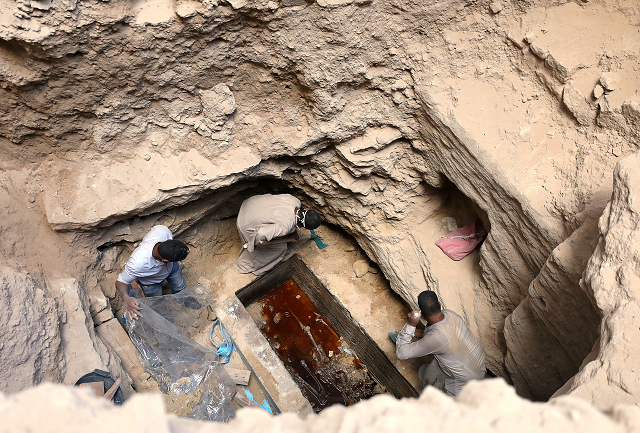Mysterious black sarcophagus found in Alexandria
Tomb dates back to 323 BC

Archaeologists unearth coffin containing three mummies with sewage water and bones inside, in Alexandria, Egypt. PHOTO: REUTERS.
A massive black granite sarcophagus has been discovered by archaeologists in the Egyptian city of Alexandria.
Untouched for over 2, 000 years, rumours that the mysterious tomb was either cursed or the resting place of Greek conquered Alexander the Great surrounded the expedition. The revaltion, however, was less appealing as the archeologists, appointed by Egypt's ministry of antiques, came face-to-face with three skeletons and sewerage water.
Cyprus hands Egypt ancient artefacts stolen in 1980s
According to Egyptian news outlet El-Watan, the archeologists initially lifted the lid by two-inch before the smell forced them to shut it. The tomb was opened with help from Egyptian military engineers.
"We found the bones of three people, in what looks like a family burial... Unfortunately the mummies inside were not in the best condition and only the bones remain," said Mostafa Waziri, secretary-general of the Supreme Council of Antiquities.
Dispelling rumours, Waziri added: "We've opened it and, thank God, the world has not fallen into darkness. I was the first to put my whole head inside the sarcophagus...and here I stand before you...I am fine."
However, the site has been cleared due to fears of lethal toxic fumes emanating from the tomb, reports the state-owned newspaper Al Ahram.
Egypt opens Gaza border for month of Ramazan
Experts speculate that the three bodies may belong to soldiers during the time of the Pharaohs - dating back to an era that began in 323 BC following the death of Alexander the Great. Approximately two-metres high and weighing 27 tonnes, the tomb is the largest structure of its kind found intact.
Archaeologists will now examine the tomb in details to pinpoint the era when the buried soldiers lived and discover how they died.
This article originally appeared on BBC News.





1725099588-0/BeFunky-(41)1725099588-0-208x130.webp)













COMMENTS
Comments are moderated and generally will be posted if they are on-topic and not abusive.
For more information, please see our Comments FAQ